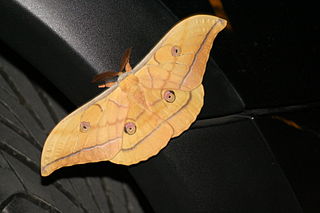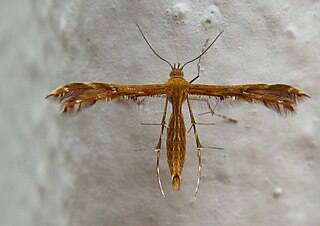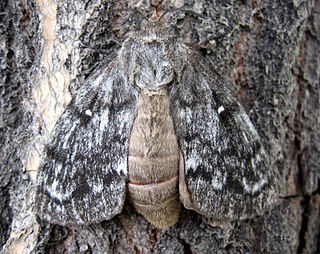
Japan is an island country in East Asia. It is in the northwest Pacific Ocean and is bordered on the west by the Sea of Japan, extending from the Sea of Okhotsk in the north toward the East China Sea, Philippine Sea, and Taiwan in the south. Japan is a part of the Ring of Fire, and spans an archipelago of 14,125 islands, with the five main islands being Hokkaido, Honshu, Shikoku, Kyushu, and Okinawa. Tokyo is the country's capital and largest city, followed by Yokohama, Osaka, Nagoya, Sapporo, Fukuoka, Kobe, and Kyoto.

The peppered moth is a temperate species of night-flying moth. It is mostly found in the northern hemisphere in places like Asia, Europe and North America. Peppered moth evolution is an example of population genetics and natural selection.

Lepidoptera or lepidopterans is an order of winged insects that includes butterflies and moths. About 180,000 species of the Lepidoptera have been described, representing 10% of the total described species of living organisms, making it the second largest insect order with 126 families and 46 superfamilies. and one of the most widespread and widely recognizable insect orders in the world.

A plum is a fruit of some species in Prunus subg. Prunus. Dried plums are most often called prunes, though in the United States they may be just labeled as 'dried plums', especially during the 21st century.

Moths are a group of insects that includes all members of the order Lepidoptera that are not butterflies. They were previously classified as suborder Heterocera, but the group is paraphyletic with respect to butterflies and neither subordinate taxon is used in modern classifications. Moths make up the vast majority of the order. There are approximately 160,000 species of moth, many of which have yet to be described. Most species of moth are nocturnal, although there are also crepuscular and diurnal species.

Bombyx mori, commonly known as the domestic silk moth, is a moth species belonging to the family Bombycidae. It is the closest relative of Bombyx mandarina, the wild silk moth. Silkworm are the larvae of silk moths. The silkworm is of particular economic value, being a primary producer of silk. The silkworm's preferred food are the leaves of white mulberry, though they may eat other species of mulberry, and even leaves of other plants like the osage orange. Domestic silk moths are entirely dependent on humans for reproduction, as a result of millennia of selective breeding. Wild silk moths, which are other species of Bombyx, are not as commercially viable in the production of silk.

Ypsolophidae is a family of moths with some 160 species. They are included in the Plutellidae by many authors.

Norman Barnett Tindale AO was an Australian anthropologist, archaeologist, entomologist and ethnologist.

The de Havilland DH.60 Moth is a 1920s British two-seat touring and training aircraft that was developed into a series of aircraft by the de Havilland Aircraft Company.

The DH.83 Fox Moth is a small biplane passenger aircraft from the 1930s powered by a single de Havilland Gipsy Major I inline inverted engine, manufactured by the de Havilland Aircraft Company.

Copromorphidae, the "tropical fruitworm moths", is a family of insects in the lepidopteran order. These moths have broad, rounded forewings, and well-camouflaged scale patterns. Unlike Carposinidae the mouthparts include "labial palps" with the second rather than third segment the longest. With other unusual structural characteristics of the caterpillar and adult, it could represent the sister lineage of all other extant members of this superfamily. The genus Sisyroxena from Madagascar is also notable for its unusual venation and wing scale sockets.

HMS Moth was an Insect-class gunboat of the Royal Navy. Entering service in 1916, Moth had a varied career with service in the Middle East, the White Sea and the Far East in two world wars. Scuttled in World War II during the invasion of Hong Kong, the ship was raised and put into service by the Imperial Japanese Navy as Suma (須磨). The ship remained active throughout the war, before striking a naval mine in the Yangtze River in 1945 and sinking.

Chairlift was an American synth-pop band formed by Caroline Polachek and Aaron Pfenning. They formed the band in 2005 while living in Boulder, Colorado, and Patrick Wimberly joined them when they moved to Brooklyn, New York, in 2007. The three released their debut album Does You Inspire You in 2008. Pfenning left the band in 2010, and the new duo released two more albums—2012's Something and 2016's Moth—before announcing the end of Chairlift in December 2016.

440 Transport Squadron is a unit of the Canadian Armed Forces under the Royal Canadian Air Force. It is part of 8 Wing and works closely with Joint Task Force (North) in Yellowknife, Northwest Territories.

Antheraea yamamai, the Japanese silk moth or Japanese oak silkmoth is a moth of the family Saturniidae. It is endemic to east Asia, but has been imported to Europe for tussar silk production and is now found in southeastern Europe, mainly in Austria, northeastern Italy, and the Balkans. It seems to be spreading north and a population has been reported near Deggendorf and Passau in Germany. The species was first described by Félix Édouard Guérin-Méneville in 1861. It has been hybridized artificially with Antheraea polyphemus of North America.

Stenodacma wahlbergi is a moth of the family Pterophoridae described by Philipp Christoph Zeller in 1851. It is known from Japan, China, Saudi Arabia, Iran, Sri Lanka, India, Central, East and South Africa, St. Helena, Mauritius, the Seychelles and Rodrigues. It has recently been recorded from Vietnam. Records for Australia were based on synonymisation with Stenodacma pyrrhodes.

Dendrolimus superans, also called the white-lined silk moth, Sakhalin silk moth, Japanese hemlock caterpillar, Siberian silk moth, Siberian moth, Siberian conifer silk moth, Siberian lasiocampid or larch caterpillar, is a moth of the family Lasiocampidae.

Agonopterix is a moth genus of the superfamily Gelechioidea. It is placed in the family Depressariidae, which was often – particularly in older treatments – considered a subfamily of the Oecophoridae or included in the Elachistidae.

Gracillariinae are a subfamily of moths which was described by Henry Tibbats Stainton in 1854.



















